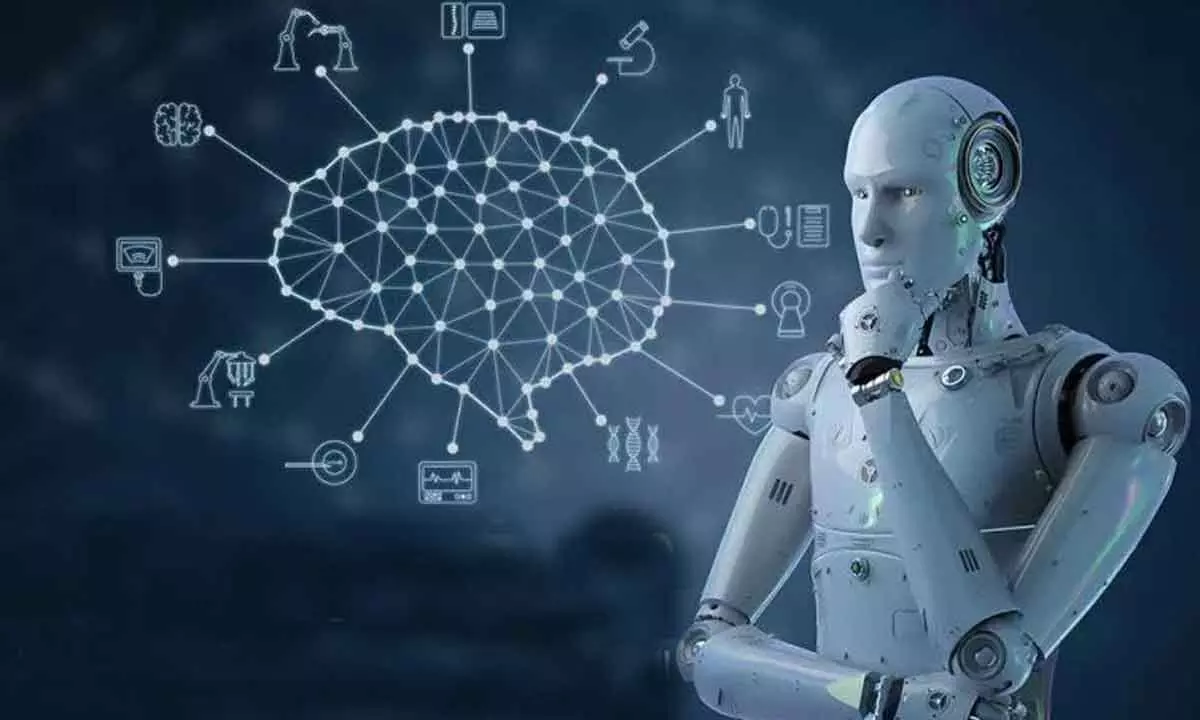Live
- Democracy ingrained in our lives: PM Modi at PBD convention
- Provide quality healthcare to patients at Ruia Hospital
- PM Modi flags off Pravasi Bharatiya Express, a special tourist train for NRIs
- Bengaluru overtakes Chennai to be India’s best city for working women in 2024
- Centre sanctions Rs 107.79 cr for RoB at Gaddipadu
- Govt PSU to go public in tourism sector, travel packages
- CM fears threat to his chair if he tries to check corruption: Bommai
- Loyola College celebrates Ethnic Day, Sankranti Sambaralu
- ED raids BBMP head office, inspects documents of two major projects
- Mangaluru Lit Fest 2025 to be held between January 11-12
Just In
Revolutionising Indian-policing through generative AI interaction


The Indian Criminal Justice System has long grappled with challenges such as manpower shortages, cultural biases and inefficiencies inherited from the...
The Indian Criminal Justice System has long grappled with challenges such as manpower shortages, cultural biases and inefficiencies inherited from the colonial era. The demands for sensitivity and efficiency in policing have grown louder, highlighting the need for a transformation. Enter the Generative AI Revolution, a force that has the potential to revolutionize the Indian police force and align it with Prime Minister Narendra Modi’s vision of a SMART (Strict but Sensitive, Modern and Mobile, Alert and Accountable, Reliable and Responsive, Techno-savvy and Trained) police. By harnessing the power of Generative AI, Indian Police can enhance their productivity, investigate efficiently, streamline the case documentation and ultimately empower all stakeholders within the criminal justice system.
Empowering citizen-police interactions
Imagine Vandana, a 14-year-old who faced abuse at her school but felt too shy to confide in anyone. Thanks to the integration of AI in policing, Vandana now has a lifeline. She can chat or talk to an AI Police Bot in her own language, sharing her experience without fear or hesitation.
The first step in dealing with the situation is to offer her emotional support in an objective, empathetic and prejudice free manner, for which the interactive AI based bot is already trained for. The AI bot acts as a well-trained empathetic counselor, offering guidance, reassuring her of her rights, and collecting relevant details in a non-intrusive manner. The second step now involves drafting a complaint, the same bot can help her in drafting a coherent complaint with minimal effort reflecting accurately the facts she presents to the bot.
Enhancing investigation process
AI as an Investigative Partner brings a newfound level of precision and efficiency to the investigation process. In Vandana’s case, once she files her complaint, an Investigating Officer (IO) takes up the case, with AI providing invaluable assistance at every step. AI assists the IO in determining the appropriate investigative measures, recommending evidence collection methods, identifying key witnesses to interview, and suggesting relevant laws, sections, and procedures. This AI-powered assistance helps the IO build a strong case, ensuring that Vandana’s voice is heard, her rights and privacy are protected.
Streamlining documentation
Documentation is a critical aspect of policing, and Generative AI simplifies and streamlines this often cumbersome process. In Vandana’s case, AI can play a pivotal role in documenting accurate case diaries. This automation eliminates the risk of human error, ensures strict compliance of our complex legal processes and saves valuable time for the IO. AI also ensures that no critical elements or evidence of the crime are overlooked when preparing the chargesheet. By automating documentation tasks, officers can redirect their time and resources to essential investigative activities, expediting legal proceedings and ensuring a strong case against the perpetrators, making AI a Reliable Documenting Assistant.
Improving conviction rates
AI as a Probabilistic Evaluator not only empowers officers with valuable insights but also improves conviction rates by identification of cases with a higher probability of success which can be prioritized. In Vandana’s case, AI models trained on previously convicted cases can analyze the strength of evidence, historical case outcomes, and relevant precedents to determine the likelihood of successful conviction°. This AI-powered assessment enables the IO to make informed decisions before submitting the charge sheets to court. AI’s transparent evaluation helps avoid the wastage of crucial resources of both the police and the courts, leading to a more efficient criminal justice system.
Assisting public prosecutors
During the trial stage, Generative AI can provide invaluable support to public prosecutors. In Vandana’s case, AI-powered tools can aid in the preparation of persuasive arguments, analyzing case precedents, and identifying potential weakn esses in the defense’s arguments. AI also assists in witness preparation, offering insights and suggestions to ensure effective and impactful testimonies. By leveraging AI technology, public prosecutors can enhance their courtroom performance, delivering more robust legal arguments and increasing the likelihood of successful convictions. It can thus be an effective Legal Support System.
Conclusion
As the Generative AI revolution gains momentum, it is essential for Indian Police to embrace this transformative technology. By harnessing the power of AI, officers can enhance their productivity, streamline documentation, and optimize resource allocation. The case of Vandana illustrates how AI empowers victims, improves investigations, and fosters a more just society. As India moves towards building a SMART police force, AI becomes a crucial tool in achieving the vision of a system that is strict yet sensitive, modern yet mobile, alert yet accountable, reliable yet responsive, and techno-savvy yet trained. It is imperative for Police leadership to create avenues and platforms to encourage young police officers to adopt AI as early as they can.
(The author is currently serving as ASP Chintapalli, in Andhra Pradesh cadre)

© 2024 Hyderabad Media House Limited/The Hans India. All rights reserved. Powered by hocalwire.com






